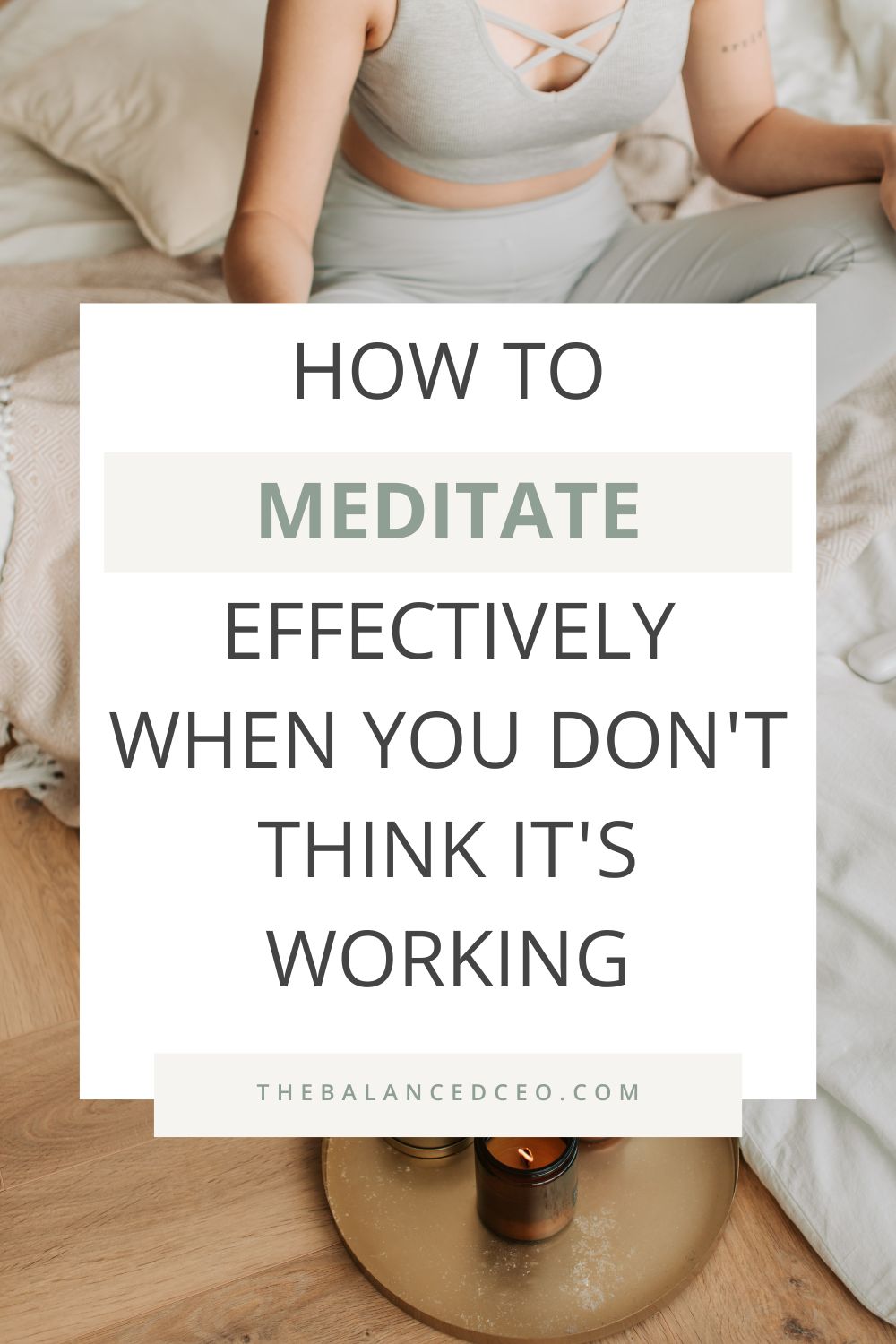This post may contain affiliate links, which means I’ll receive a commission if you purchase through my links, at no extra cost to you. Please read full disclosure for more information.

If you are struggling to meditate effectively, just know that you are not alone. Everyone has their own pace when it comes to meditation and it is not always linear either. Meditation is supposed to be a time to quiet the mind and experience bliss and rejuvenation, but being an overthinker can get in the way.
Quieting the mind is more challenging than it seems. In a fast-paced society, turning off your worries and fully tuning into your body can be an uphill battle. Here is how to meditate effectively when you don’t think it’s working.
Create a Routine
The power of having a routine should not be overlooked. Your brain will start getting into the habit of meditation during your scheduled time, making things easier. If you continuously try to squeeze your meditation in with the rest of your daily obligations, it may be challenging to quiet your mind for the time being.
When you don’t have time and a place dedicated to your practice, the right mind frame is difficult to get into. Like anything else, consistency and attitude are everything. If you want to work towards a smooth meditation, you should lock in a time and place for your meditation to practice every day to ensure you get all the benefits. It will strengthen the correlation between intention and meditation and increase its effectiveness over time.
Although meditation doesn’t have rules, it is best to practice at a time that you will stick to. Ensure it is a time that feels intuitive and when your mind has the least going on.
Make Clear Goals
Do you have a reason you are meditating with a vision for what you want to accomplish? Your goal of meditation should be very clear since it is an important part of the outcome of how it feels.
Everyone’s goals will look different and may change throughout your journey. The important part is to stay in tune with whatever your goal is. Try writing down reasons for meditating and making a plan for how you want to achieve each goal. The practice will become easier when you have clarity for your meditation goals.
Create a Meditation Spot
Sometimes, your environment could be the reason meditation is difficult for you. Your mind can feel the same if you are surrounded by laundry or a cluttered room. Consider making a spot in your home dedicated to meditating.
It can be a clean and calm environment that allows your headspace to quiet down easier. The routine of heading to that space can help your mind realize that it is time to meditate similar to when you get in bed, your body associates it with rest.
Set the right mood by incorporating sensory elements into your space. Use candles or essential oils to fill the room with a calming scent. Even surrounding yourself with certain colors can help improve your focus. Yellow, for example, can evoke feelings of happiness or positivity, while green symbolizes renewal and growth.
Related Reads:
• 8 Tips for Starting a Meditation Practice
• 10 Morning Mindfulness Practices to Start Your Day Right
Utilize Meditation Videos
If you find your mind wandering during meditation, recorded videos can help keep you on track. Listening to a voice guide you through your practice will silence the other areas of your brain that are running and give you something to focus on at the moment.
Guided meditations are great since there are so many options available. No matter what your goal is, there is sure to be a guided meditation you can follow that aligns with it. You may meditate to reduce anxiety, boost your mood, or fall asleep. Either way, there are plenty of options.
You can adjust the amount of time you meditate effectively too. Sometimes it is beneficial to start with a shorter time and build your way up to focusing on the practice longer.
Reframe Your Expectations
If you think your mind needs to be blank when meditating, you should reframe your thoughts. The more you focus on settling your racing thoughts, the less you will experience the joy and ease that comes with it.
When you should be meditating, you are focusing on fighting the thoughts instead of being in the moment and what it means to meditate effectively. The more you focus on it, the harder it will be for the thoughts to stop. Part of meditation is letting everything be as it is, so if your mind seems to be running that day, be gentle and let the thoughts pass.
Having a quiet mind is helpful but not necessary. One of the principles of meditation is letting things be as they are, so even if your mind is a storm of thoughts, watch the thoughts come and go. It is natural for the mind to think, so trying to stop thoughts goes against its natural ways.
Start Small
Instead of viewing meditation as one concept, think of it as putting the puzzle pieces together. You won’t go directly into that state of mind when you sit down to meditate. Take one step at a time to reach where you want to be.
An excellent place to start is with your breath. Most meditation is centered around your breathwork, constantly revisiting it in the practice. Breathwork helps with mental and emotional benefits by reducing feelings of anxiety or calming your nervous system. When your breath is your focal point, it keeps you on track if your mind wanders.
Listen to Music
Listening to music during meditation is another way to shift your focus from your thoughts to the peaceful sounds around you. Soft and calming music can even enhance the experience for people with anxiety and worry about a busy mind. The best music is anything that will help with focus and relaxation.
Release Negative Thoughts
If you have tried meditation a couple of times and it didn’t work out for you, your brain may have a negative stigma surrounding the concept. If you build up this idea that you can’t do it, you will want to kick this negative thought to the side. Even if it doesn’t come to you immediately, practice will allow anyone to meditate effectively.
Don’t create a problem that isn’t truly there. Meditation helps you get to know yourself and is a free way to experience peace when time and effort are put into it.
Make Your Meditation Effective
Meditation has so many benefits, including relaxation and self-exploration. Even if you find it hard to focus during meditation, making minor adjustments can completely change your experience.
Did these tips help you to meditate effectively? Let us know in the comments below!

Cora Gold
Contributor
Cora Gold is the Editor-in-Chief of Revivalist magazine, a publication dedicated to happy, healthy, and mindful living.





Leave a Reply